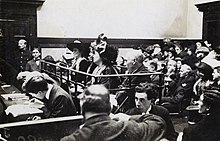| Act of Parliament | |
 | |
| Long title | An Act to amend the law with respect to the administration of criminal justice in England, and otherwise to amend the criminal law. |
|---|---|
| Citation | 15 & 16 Geo. 5. c. 86 |
| Dates | |
| Royal assent | 22 December 1925 |
Status: Amended | |
| Text of statute as originally enacted | |
| Text of the Criminal Justice Act 1925 as in force today (including any amendments) within the United Kingdom, from legislation.gov.uk. | |

The Criminal Justice Act 1925 (15 & 16 Geo. 5. c. 86) is an Act of the Parliament of the United Kingdom. Most of it has been repealed.
Section 36 of the Act makes it an offence to make a false statement to obtain a passport. The maximum sentence is two years.
Section 41 prohibits the taking of photographs in a court in England and Wales, save for the Supreme Court.[1] In September 2011, Lord Chancellor Kenneth Clarke announced that the government intended to partially repeal this ban in order to increase the public's understanding of the administration of justice.[2] Initially, filming of the handing down of judgments in the Court of Appeal was to be permitted, with a view that filming of sentencing remarks will eventually be permitted in the Crown Court.[3] The first case of sentencing remarks being filmed in a Crown Court was on 28 July 2022 at the Old Bailey which saw sentence passed on Ben Oliver whom had been convicted of manslaughter. The broadcast was hosted on the Sky News YouTube channel with a 10 second delay to avoid breach of restrictions or errors.[4]
Other provisions of the Act deal with criminal procedure against corporations, the defence of marital coercion (since abolished), and unlawful possession of pension documents.
- ^ This exception was added by section 47(1) of the Constitutional Reform Act 2005 when the court was created.
- ^ UKPA, "Clarke to lift court filming ban", Google News (6 September 2011) [dead link]
- ^ BBC News, "Court broadcast of judges' remarks to be allowed", news.bbc.co.uk (6 September 2011)
- ^ "Crown Court sentencing remarks to be broadcast for first time". GOV.UK. 28 July 2022.